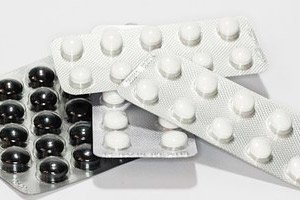
All iLive content is medically reviewed or fact checked to ensure as much factual accuracy as possible.
We have strict sourcing guidelines and only link to reputable media sites, academic research institutions and, whenever possible, medically peer reviewed studies. Note that the numbers in parentheses ([1], [2], etc.) are clickable links to these studies.
If you feel that any of our content is inaccurate, out-of-date, or otherwise questionable, please select it and press Ctrl + Enter.
Antihistamines
Medical expert of the article
Last reviewed: 04.07.2025

Antihistamines block H1-histamine receptors (including those in the bronchi), thereby reducing bronchospasm, capillary permeability and bronchial edema, and suppressing excessive bronchial reaction to histamine. They do not solve the problem of bronchial asthma, but in some cases, especially in the presence of polyvalent allergies, they can be used in the complex therapy of atopic bronchial asthma.
Indications antihistamines
Dosing and administration
There are 2 generations of antihistamines used.
Antihistamines of the 1st generation
First generation antihistamines are classic antihistamines.
- Diphenhydramine - prescribed 0.03-0.05 g orally 2-3 times a day for 10-15 days or as a 1% solution intramuscularly 1 ml 1-2 times a day. Often causes drowsiness.
- Fenkarol is available in 0.025 g tablets, take 1 tablet 3-4 times a day after meals for 10-20 days. Unlike diphenhydramine, the drug not only blocks H1-histamine receptors, but also reduces the histamine content in tissues (since it activates diamine oxidase, an enzyme that destroys histamine). It does not have a pronounced sedative effect and does not cause drowsiness.
- Pipolfen (diprazine) - is available in tablets of 0.025 g, prescribed orally 1 tablet 2-3 times a day after meals or intramuscularly 1-2 ml of a 2.5% solution. The drug has a fairly pronounced sedative effect.
- Diazolin is available in tablets of 0.05 and 0.1 g, prescribed orally 1 tablet 3 times a day, as a rule, does not cause sedative and hypnotic effects.
- Dimebon - is available in tablets of 0.01 g, taken orally 1 tablet 3 times a day (regardless of food intake). May have a sedative effect. Along with the antihistamine effect, it causes a partial antiserotonin effect.
- Suprastin is available in 0.025 g tablets and 1 ml ampoules of 2% solution. It is prescribed orally at 0.025 g 3 times a day during meals, 1-2 ml of 2% solution can be administered intramuscularly. The drug has antihistamine and peripheral anticholinergic activity.
- Tavegil - is available in 1 mg tablets, 2 ml ampoules of 0.1% solution. It is similar to diphenhydramine, but is more active and acts longer (8-12 hours after a single dose). It is prescribed at 1 mg in the morning and evening, the daily dose can be increased to 3-4 tablets. It causes a moderate sedative effect.
Disadvantages of first generation antihistamines:
- have a sedative and hypnotic effect due to good penetration through the blood-brain barrier and blockade of central histamine receptors;
- impair concentration and cause ataxia (contraindicated for patients working as drivers, operators, dispatchers, etc.);
- exhibit an anticholinergic effect, which is expressed in dry mouth, tachycardia, urinary retention, constipation, and impaired accommodation;
- increase the viscosity of sputum in patients with bronchial asthma, which aggravates bronchial obstruction;
- have a hypotensive effect;
- cause addiction with prolonged use, and therefore it is advisable to change drugs every two weeks.
 [ 13 ], [ 14 ], [ 15 ], [ 16 ]
[ 13 ], [ 14 ], [ 15 ], [ 16 ]
Antihistamines of the second generation
Second-generation antihistamines have the following advantages over first-generation drugs:
- do not have a sedative or hypnotic effect, as they are lipophobic and poorly penetrate the blood-brain barrier;
- selectively block H1-histamine receptors, do not have anticholinergic and adrenolytic activity;
- quickly show a therapeutic effect (within 30-60 minutes) due to good absorption from the gastrointestinal tract;
- form strong bonds with H1-histamine receptors and are slowly excreted from the body, therefore they have a long-lasting effect and can be used 1-2 times a day (with the exception of acrivastine);
- do not cause addiction even with prolonged use;
- reduce the release of mediators from mast cells and basophils along with the blockade of H1-histamine receptors and, to a certain extent, can exhibit an anti-inflammatory effect.
- Terfenadine (terfen, triludan, teldan) - used at 0.06 g 2 times or 0.12 g 1 time per day.
- Astemizole (gismanal) - prescribed at 10 mg once a day.
- Terfenadine and astemizole can cause heart rhythm disturbances, so they are not used in concomitant cardiovascular diseases.
- Loratidine (Claritin) - prescribed at 0.01 g (1 tablet) once a day.
- Acrivastine (Semprex) - used in capsules, 1 capsule 2-3 times a day.
- Cetirizine (Zyrtec) - used 10 mg once a day (during dinner).
Attention!
To simplify the perception of information, this instruction for use of the drug "Antihistamines" translated and presented in a special form on the basis of the official instructions for medical use of the drug. Before use read the annotation that came directly to medicines.
Description provided for informational purposes and is not a guide to self-healing. The need for this drug, the purpose of the treatment regimen, methods and dose of the drug is determined solely by the attending physician. Self-medication is dangerous for your health.

